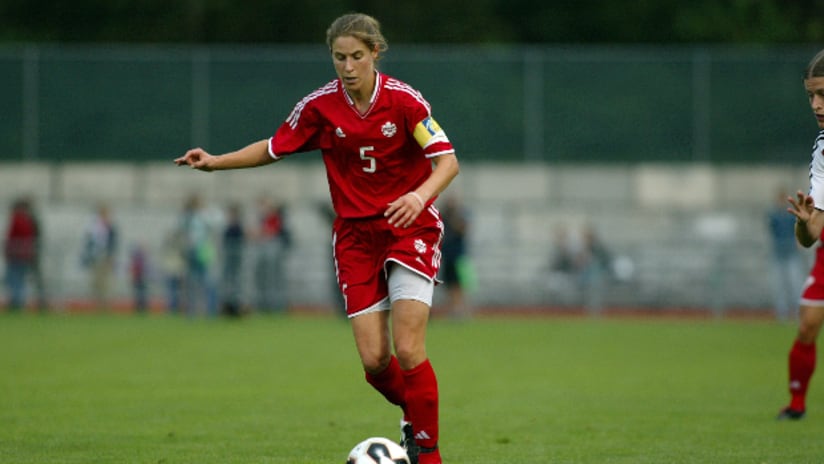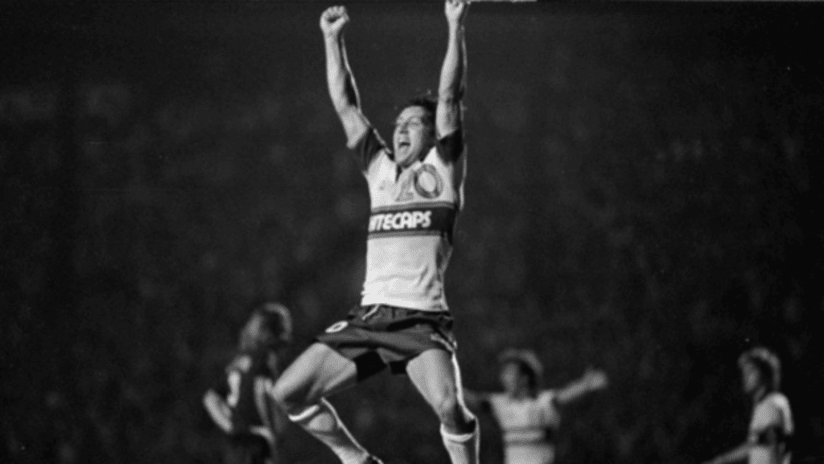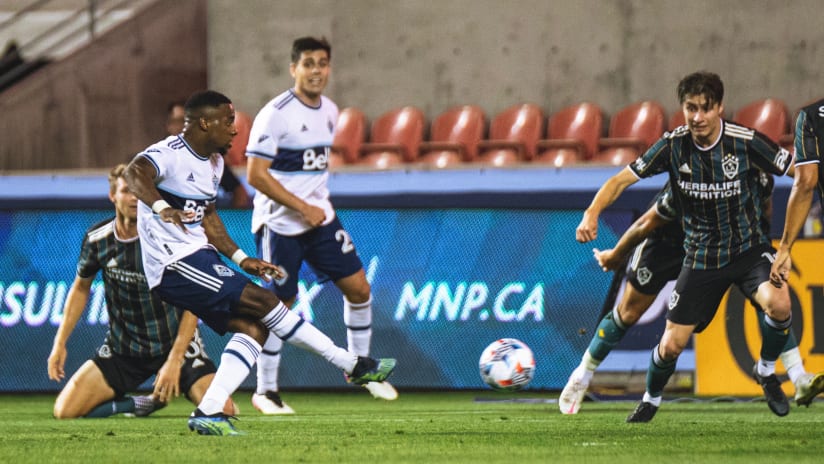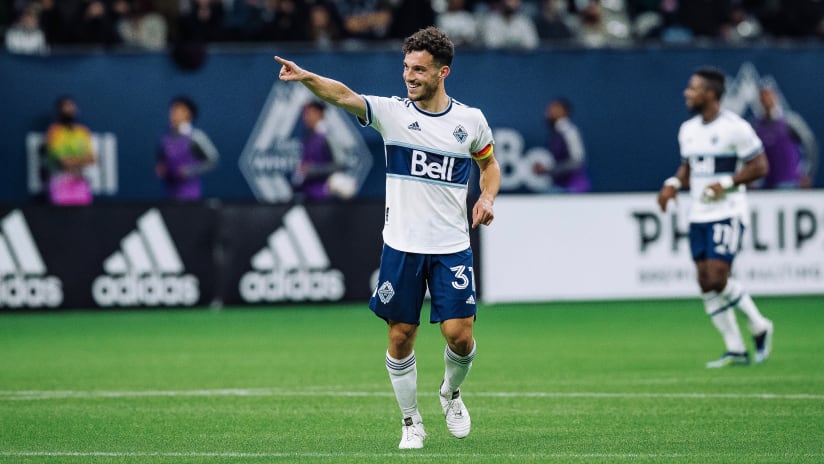This coming Tuesday, November 8, former Vancouver Whitecaps FC women’s team captain Andrea Neil will become the first female soccer player to be inducted into Canada’s Sports Hall of Fame at an induction dinner and ceremony in Calgary, Alberta.
“Andrea is a true pioneer,” said Bob Lenarduzzi, president of Vancouver Whitecaps FC. “She is a terrific role model and one of the best women’s soccer players we’ve ever had in Canada. Her dedication to the growth of the sport has paved the way for future generations to succeed.”
Joining Neil in the Class of 2011 are Stanley Cup champion Ray Bourque, former BC Lions kicker Lui Passaglia, triathlon great and Ironman champion Peter Reid, 10-time Paralympic medallist Lauren Woolstencroft, and International Olympic Committee member and former head of the World Anti-Doping Agency Richard Pound.
Before departing, whitecapsfc.com caught up with Neil to talk about her latest accomplishment and her distinguished career.
Q: What does it mean to become the first female soccer player inducted into the Canadian Sports Hall of Fame?
A: First of all, it’s completely humbling. I have a great sense of gratitude towards the situation and I’m also very aware of the history and the females who have played the game before me that never got a chance for this type of opportunity. I stand to represent all players, not just myself.
Q: Who were your role models growing up?
A: For me, because there was no national team before 1986 – my first national team experience was in ’91 – my role models that I had were more male role models from other sports at that point. The Wayne Gretzkys and the Michael Jordans were people that I followed. I knew that I was never going to play in the NHL or the NBA, but you just take those qualities from them as athletes.
As I began to play the game, you come across your teammates and opponents and you take little bits here and there from other people.
Most importantly, I learned a lot of life through my parents. So for me, I always thought if I could be a quarter of the people that they were, that would be okay. I would say those were my life role models, and modeling them made me a better soccer player.
Q: Did you ever imagine growing up that you would get to this point?
A: I never once thought about that. In fact, it was when I retired in 2007 that I was finally able to look back upon my career and look at it a different way from when I was a player.
The truth was that I didn’t start out as a soccer player. I started out as an all-around athlete and a badminton player. It wasn’t until I got some opportunities when I was about 17-years-old that I realized I could become a soccer player. Because I was constantly learning the sport at an older age as I went into my soccer career, you don’t think about racking up anything. In fact, I’m most proud of collectively what we were able to accomplish as a group of people – players, staff members – along the way.
Q: I’d heard that you were quite the badminton player. Can you tell us more about that?
A: I played on a youth national team. I played competitively on a national level up until under-19, so that was my main sport.
It was a motorcycle accident that actually made me decide that soccer was my sport and that I was ready to hang up the racquet and pick up a pair of soccer boots. It’s amazing when you’re at a stage when things can be taken away from you – limbs or life even – that you realize really what you want in life. That happened when I was 20-years-old. Every challenge that you face in life is an opportunity to redefine yourself. If you were just faced with a nice smooth path in life, then I don’t think we’d all live up to what we could potentially be.
Q: Were there ever any other careers that you thought you might pursue?
A: Quite often when you go to university you think, out of this you’ll find your career. Although I had a great time at UBC, I think through those university years I’d sort of grown up with the game and the game had evolved a lot. I wasn’t intending to make a career out of soccer, it was just year by year different opportunities came up.
I think of soccer as pre-1999 and post-1999 for the female game. It really exploded from a career that you couldn’t really maintain full-time as an athlete, to after 1999 and the explosion down in the United States with the FIFA Women’s World Cup there, where people could start the funding and the opportunity just grew year by year.
Q: How important is it to have the Whitecaps FC women’s team here in Vancouver?
A: To be a part of Vancouver Whitecaps FC was huge. It’s not a stepping stone; it’s something you just step onto to get to the national team. At that point it really complemented the training environment. It wasn’t possible to train year-round [with the national team] early in those years, so this gave a great competitive environment for many of the athletes to get together and train together day-in and day-out. The Whitecaps franchise came at a very timely time in my career, and it offered all of us a great springboard to develop.
Q: What made those two championship teams with Whitecaps FC so special?
A: Those were really the best days that I can remember with the Whitecaps. The team support, the franchise support, the group of players that we had was just a very special group and the coaching was really good. The fan support was incredible and it really made the Vancouver Whitecaps franchise the jewel of Canada in terms of what they were putting into women’s soccer. On paper, we were probably more expected to win in 2006, whereas 2004 was a surprise. We were the underdogs and that was an incredibly satisfying thing, but ultimately a great group of people from all aspects.
Q: What is your fondest memory during your career?
A: In high performance sport there is such a fine line between success and failure. Obstacles and failure can define you the most with how you choose to react to them.
It was maybe in 2003 when we finished fourth in the World Cup. It was one of those things where all of the little tipping points went in our favour and we got through the first round. It was just an all-around team effort, and that ability to look into your teammates eyes and know that they have your back and know that things are going to be okay. Out of it came a very successful run, and that was one of the proudest moments that I had as a soccer player, because it was so difficult, yet so gratifying because we did it together, and against the odds.
Q: How big will it be for Canada to host the FIFA Women’s World Cup in 2015?
A: This is an incredible opportunity. Canada’s proven that it does a great job of hosting tournaments. Those were some great times for Canadian soccer with the under-19 FIFA Women’s World Cup in 2002, and then even in 2003 when the FIFA Women’s World Cup was quite close to home down in the United States. People are watching more and more and I think it’s going to be great for Canadians, but also an education for Canadians to get behind something in our own backyard.
Q: What advice would you give to young aspiring players?
A: I think it’s always important to hammer home the intangibles; the things that you can’t quite measure are incredibly important and quite often separate one player from the next. It’s not necessarily how many goals you score, but it could be how you are as a leader, how you are with communication, what you offer to your team, and I think that if we can look at those aspects more and put more of an emphasis on those aspects, that would be really important.
Q: What next for Andrea Neil?
A: With anything, you take a little step back to re-evaluate and look backwards and learn. I’m looking forward to figuring out the ‘what’s next’ plan, however that looks. In the future, I know I’m better for my past experience. I’m looking forward to the next opportunity, whatever it is, inside of soccer or outside of soccer. But a little bit of time first.





